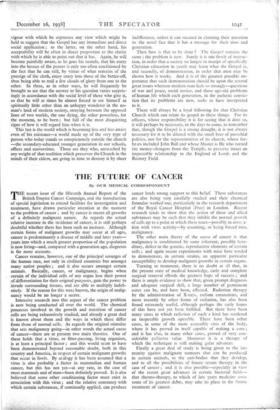THE FUTURE OF CANCER
By OUR MEDICAL CORRESPONDENT
Cancer remains, however, one of the principal scourges of the human race, not only in civilised countries but amongst many native peoples ; and it also occurs amongst certain animals Basically, cancer, or malignancy, begins when certain of the individual cells of any organ lose their power of differentiation for their original purposes, gain the power to invade surrounding tissues, and are able to multiply indefi- nitely. If the reason for this were known, the origin of malig- nancy would be no longer a secret.
Intensive research into this aspect of the cancer problem is now being conducted all over the world. The chemical processes involved in the growth and nutrition of cancer cells are being exhaustively studied, and already a great deal is known about them and the ways in which these differ from those of normal cells. As regards the original stimulus that sets malignancy going—in other words the actual cause of cancer—there are at present two main theories. One of these holds that a virus, or filter-passing, living organism, is at least a principal factor ; and this would seem to have been demonstrated beyond reasonable doubt, both in this country and America, in respect of certain malignant growths that occur in fowls. By aralogy it has been assumed that a virus is also probably a factor in mammalian and human cancer, but this has not yet—at any rate, in the case of most mammals and of man—been definitely proved. It is also believed that some other conditioning factor must exist in association with this virus ; and the relative constancy with which certain substances, if continually applied, can produce cancer lends strong support to this belief. These substances are also being very carefully studied and their chemical formulae worked 'out, particularly in the research department of the Royal Cancer Hospital (Free) in London. Recent research tends to show that the action of these and allied substances may be such that they inhibit the normal growth of cells up to a point at which these react—possibly in assoc'a - don with virus activity—by assuming, or being forced into, malignancy.
The other main theory of the cause of cancer is that malignancy is conditioned by some inherent, possibly here- ditary, defect in the genetic, reproductive elements of certain cells ; and again recent experiments with mice have tended to demonstrate, in certain strains, an apparent particular susceptibility to develop malignant growths in certain organs.
Turning to treatment, there is no doubt at all that, in the present state of medical knowledge, early and complete surgical removal affords the greatest hope of success ; and there is ample evidence to show that, given prompt diagnosis and adequate surgical skill, a large number of permanent cures can be, and have been, effected. Radiation therapy by the administration of X-rays, radium emanations, and more recently by other forms of radiation, has also been found extremely useful, although perhaps the early hopes of this have noi yet been fulfilled. But there have been many cases in which radiation of such a kind has rendered an inoperable growth operable. There have been other cases, in some of the more accessible sites of the body, where it has proved in itself capable of making a cure ; and it has also, in many other cases, proved of very con- siderable palliative value. Moreover it is a therapy of which the technique is still making great advances.
Finally a great deal of study is being given to the im- munity against malignant tumours that can be produced in certain animals, to the anti-bodies that they develop, and to all the possibilities of future serum therapy in the case of cancer ; and it is also possible—especially in view of the recent great advances in certain bacterial fields— that thermo-therapy, to which of late years medicine owes some of its greatest debts, may take its place in the future treatment of cancer.














































 Previous page
Previous page